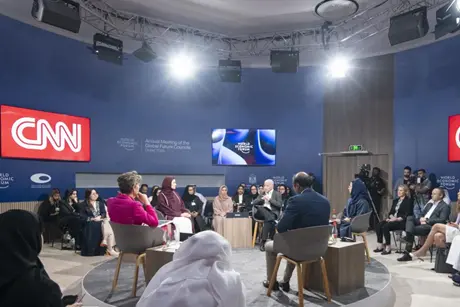PHOTO
Dubai-UAE: The UAE's flexible and agile governance, particularly in the realms of AI, regulation and education, was highlighted as a global model for success during the 2024 Annual Meeting of Global Future Councils (AMGFC24). A panel discussion, “UAE: The Next Decade” underscored how the country is leveraging technology, reskilling its workforce, and adopting flexible governance to gain a competitive edge in a rapidly changing global landscape.
Her Excellency Sarah Al Amiri, UAE Minister of State for Public Education, addressed the importance of evolving education systems to meet future demands, stating: "We need to rethink how we approach traditional education systems, focusing on skills and values that uphold who we are as nations, global citizens, and our roles in society and the economy."
She emphasized the UAE’s proactive measures in reskilling and advancing its education system to prepare the future workforce for emerging challenges.
"We are developing the tools necessary to adapt to a changing world, providing the knowledge and skills required to meet challenges and foster inclusivity in our education approach. Technology is just one of many tools rather than the solution to drive education forward," she said.
The panel also featured Her Excellency Maryam Al Hammadi, Minister of State and Secretary-General of the UAE Cabinet; Danny Quah, Dean and Professor of Economics at the National University of Singapore; and Euvin Naidoo, Distinguished Professor at Thunderbird School of Global Management.
HE Al Hammadi emphasized the crucial role of regulatory reforms in driving national progress. "The most important competitive advantage for any country is having a flexible, agile, and adaptable legislative system. The faster we can adapt to customer needs, global investor demands, and emerging technology, the more successful we are as a country," she said.
She highlighted the UAE’s significant strides in regulatory transformation to meet future priorities. "In three years, we have updated more than 75% of our regulations and repealed over 50 outdated laws. We reduced the legal age for doing business from 21 to 18 and introduced full foreign ownership in many sectors, making the UAE a more attractive place for business," she added. These changes, she noted, have enhanced the UAE’s appeal as a hub for innovation and investment, driving sustainable economic growth.
Quah highlighted the need for new kinds of regulation to address global challenges. "The grand problems we face—climate change, future pandemics, and the risks of AI—demand a new kind of regulation, one that promotes social cohesion and human well-being,” he explained.
Highlighting the UAE as a model for navigating an increasingly complex geopolitical and economic landscape, he added: "The first thing that strikes me is how ambitious this plan is, and the UAE is the place to make it happen. You’re already making plans for the energy transition, with most of your electricity coming from solar by 2050. This country has constantly surprised the world.”
Echoing this sentiment, Naidoo emphasized the UAE’s approach to agile governance, noting how adaptable regulations have unlocked innovation and enabled cross-sector collaboration. He also highlighted how the half-life of skills is shortening across industries, making it critical for countries to stay ahead.
"One of the UAE’s competitive advantages is its mindset. The UAE has shown how to manage multiple cycles of growth and remain attractive to investment by embedding innovation into its culture," he added.
AMGFC24, hosted by the UAE Government in cooperation with the World Economic Forum (WEF), is taking place from 15-17 October in Dubai. The 2024 edition features 30 councils and over 500 participants from 80 countries, including experts, thought leaders, senior government officials, and business leaders who are helping shape the agenda of the 2025 WEF Annual Meeting in Davos.




















